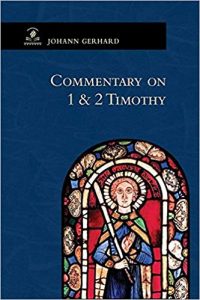 Commentary on 1 and 2 Timothy, by Johann Gerhard. Translated by Joshua J. Hayes. Saint Louis: Concordia Publishing House, 2017. 231 pages.
Commentary on 1 and 2 Timothy, by Johann Gerhard. Translated by Joshua J. Hayes. Saint Louis: Concordia Publishing House, 2017. 231 pages.
The Concordia Theological Seminary Master of Divinity Class of 2017 and Alternate Route Class of 2016 commissioned this translation of Johann Gerhard’s Commentary on 1 and 2 Timothy into English as their class gift. Lord willing, this gift will serve future generations of pastors who serve in the public ministry.
Before I started to work through this commentary, I had a presupposition that the commentary would be long, drawn-out, and exhaustive. Instead, I was pleasantly surprised to discover that this commentary was fairly simple, thorough, and easy to follow.
Gerhard takes the reader through each verse of 1 and 2 Timothy. He gives some notes on specific words and meaning and then writes a few sentences or paragraphs on the meaning of the section. He tackles the hard topics and lays out sound judgments for his understanding of the verses. After including some of his own thoughts, he discusses what others have taught about the verse and topic. For the most part, Gerhard makes it clear where he stands on the issue but also allows for other interpretations when the text is difficult. He is judicious but also fair and straight-forward.
He spends much of the commentary battling against a Catholic named Willem Hessels van Est (called Estius in the commentary). Gerhard’s assessment of Estius seems fairly unbiased: he recognizes when Estius is correct but also disputes Estius, when he teaches false doctrine. One such example is prayer to the saints. After Gerhard quotes Estius’ defense of praying to saints, he writes, “There is no command, promise, or good example that anyone trusted in dead saints. Therefore faith and trust are not to be divvied up among Christ and the saints” (9). He quotes Estius more than any other person in this book, and much of the commentary is spent refuting Catholic false doctrine. He does spend time in a number of places discussing Reformed theology. For example, he addresses the false teaching of double predestination when commenting on 1 Timothy 2:4.
Other topics that Gerhard discusses include: prayer to the saints, once saved always saved, venial and mortal sins, justification by faith alone, roles of men and women, the sufficiency of the Bible, and the necessity of good works not for salvation but for a Christian’s life, and pretty much any doctrine that Paul writes about by inspiration of the Holy Spirit in 1 and 2 Timothy.
Like all commentaries, the reader will not agree with every interpretation of a particular passage. For example, Gerhard goes too far when commenting on 1 Timothy 2:11-14 regarding the strength and abilities that women have: He writes that Satan tempted Eve first because “man has the greater mental vigor” (37).
While I cannot speak regarding the faithfulness of the translation to the original Latin, the translation itself flows smoothly and is easy to read.
This book would serve well, primarily as a commentary on the shelf of a pastor. I was glad to add another commentary on 1 and 2 Timothy for my own personal library. I have appreciated Professor Armin Schuetze’s People’s Bible Series on the pastoral epistles and think that it serves as an excellent commentary, even though its purpose is not to delve into the Greek text. Lenski also provides an excellent, more thorough commentary that examines the Greek more thoroughly. I would consider that Gerhard’s commentary on 1 and 2 Timothy fits somewhere in the middle. Gerhard has a good balance between looking at the text and working through the Greek but has some great insight and applications for pastors who are preparing a sermon or Bible study.
One also would not need an exhaustive understanding of Greek to benefit from this book. It would be fairly easy to use this like the People’s Bible books. A more thorough understanding of church history would benefit the reader, but still it would be worthwhile if someone is looking for some additional insight into the text. It is certainly worth it to have good sound Lutheran theology on the shelf. That being said, a pastor may also decide to spend his money on other commentaries that he may use more often.

